This article has been reviewed according to Science X's editorial process and policies. Editors have highlighted the following attributes while ensuring the content's credibility:
fact-checked
trusted source
proofread
Innovating firefighting technology with smart solutions to enhance urban resilience
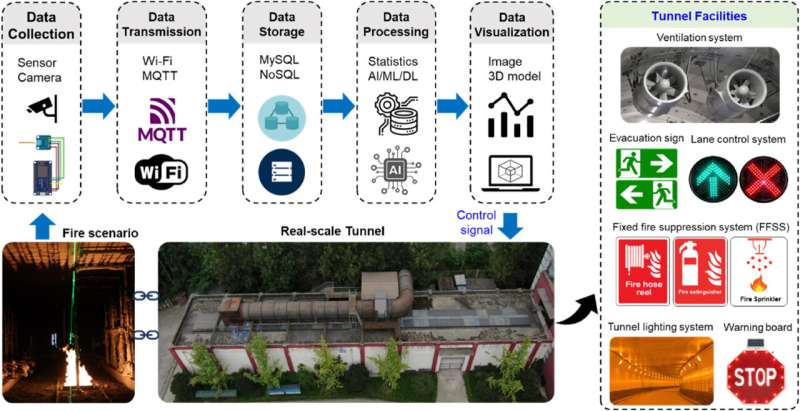
The increase in high-rise and densely populated urban development has heightened the demand for safety and resilience solutions against emergencies, such as fires. The Hong Kong Polytechnic University (PolyU) has created advanced technological solutions to enhance firefighting and urban resilience.
Prof. Asif Usmani, Chair Professor of Building Sciences and Fire Safety Engineering, and Dr. Huang Xinyan, Associate Professor of the Department of Building Environment and Energy Engineering at PolyU, hosted the 2nd International Smart Firefighting Workshop (SureFire 2024) at PolyU, which aimed to tackle future urban fire threats and enhance smart firefighting capabilities. This workshop is a component of the "SureFire: Smart Urban Resilience and Firefighting" project.
Under the research of Prof. Usmani and Dr. Huang, the SureFire System adopts complex data-generating networks to enable real-time monitoring of urban environments and hazards. Proper AI-based analysis of the data can provide information that continuously assesses the state and evolution of systems, diagnoses emerging pathologies, and supports decision-making.
The increasing occurrence of fires in high-rise buildings globally demonstrates how the evolution of the built environment has altered the nature of fire threats. At the workshop, over 70 international research experts and scholars presented emerging topics in fire safety, covering areas in fire safety design, thermal safety management for battery systems, and artificial intelligence (AI) fire forecasting.
Dr. Huang said, "Together with a multidisciplinary research team, we are uncovering answers to fundamental research questions necessary for developing the foundational technology of a smart firefighting system. This system leverages the rapidly evolving landscape of cyber-physical technologies."
To improve fire safety management during emergencies, Dr. Huang and his research team have recently introduced an intelligent digital twin system. This system couples an Artificial Intelligence of Things (AIoT) system and a computer vision model to enable real-time fire risk assessment.
Prior to a fire event, this digital twin can map the distribution of vehicles with different fire risks inside the building in real-time. In the event of a fire incident, the AI engine not only assesses the current fire scene but also forecasts the future fire progression to support fire fighting, evacuation and rescue efforts.
-
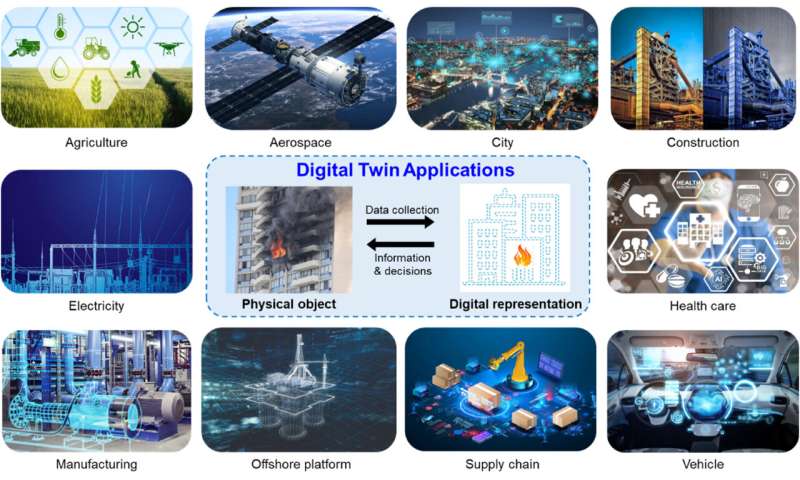
An overview of digital twin systems and their application fiels. Credit: 2024 Research and Innovation Office, The Hong Kong Polytechnic University. All Rights Reserved. -
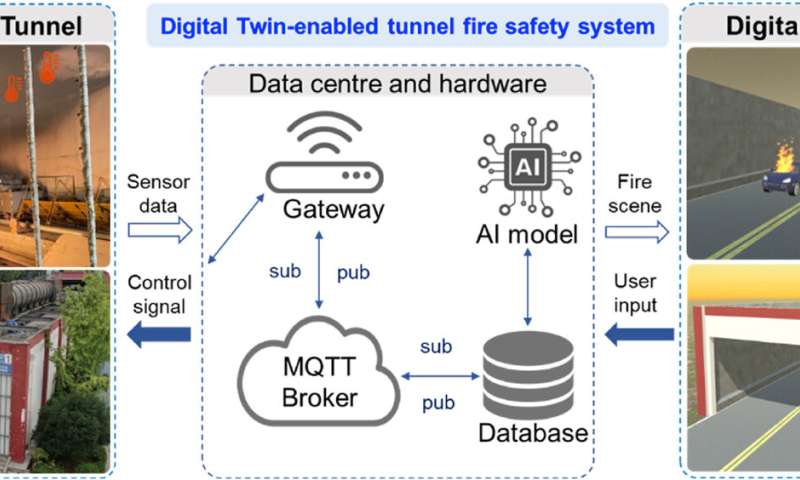
The overall Digital Twin framework for tunnel fire safety management. Credit: 2024 Research and Innovation Office, The Hong Kong Polytechnic University. All Rights Reserved.
To demonstrate the system's performance, the SureFire team has conducted multiple large-scale fire tests in tunnels in Sichuan and multi-story buildings in the Fire and Ambulance Services Academy (FASA) of the Hong Kong Fire Services Department. Leveraging advanced computational fire modeling techniques, the SureFire system can forecast the fire scene 1–3 minutes in advance with an accuracy exceeding 90%.
Dr. Huang said, "This developed SureFire system has the potential to be installed in all future buildings and infrastructures, enhancing public safety, providing early disaster warnings, and optimizing emergency evacuations." This research is a great leap towards achieving true intelligent public safety and emergency response.
The PolyU SureFire team has dedicated the past five years to developing intelligent solutions for fire safety. The latest research progress for tunnel safety include "AIoT-enabled digital twin system for smart tunnel fire safety management" published in Developments in the Built Environment, and "Smart real-time evaluation of tunnel fire risk and evacuation safety via computer vision" published in Safety Science.
The latest system provides an intelligent emergency management system framework for public fire emergencies. Also, the team is currently collaborating with multiple property management companies in China and overseas to implement the SureFire system in metro stations, tunnels, and high-rise buildings.
-
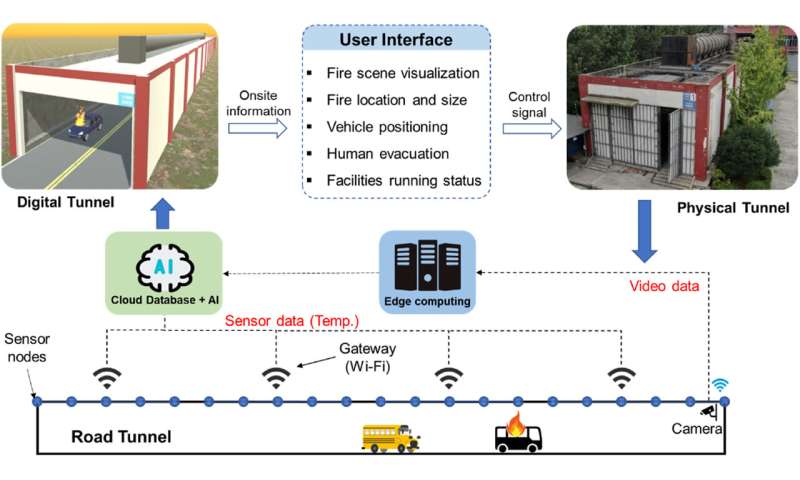
Functions and data flow of the digital twin system for firefighting. Credit: 2024 Research and Innovation Office, The Hong Kong Polytechnic University. All Rights Reserved. -
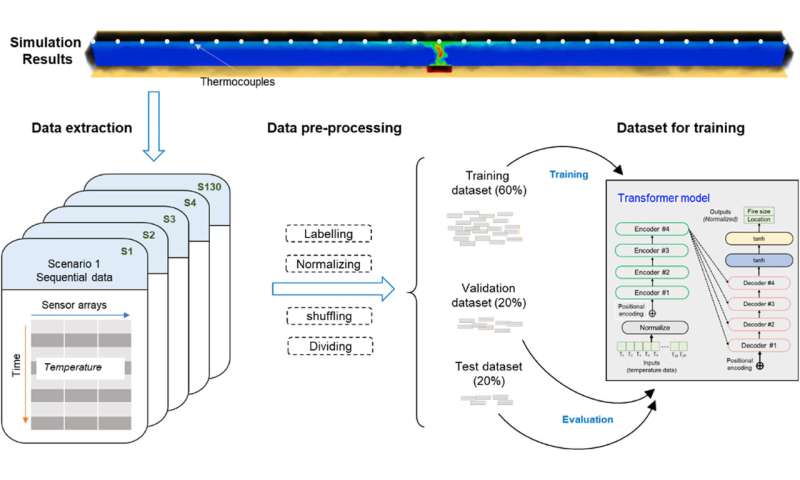
Generation of the database for model training. Credit: 2024 Research and Innovation Office, The Hong Kong Polytechnic University. All Rights Reserved.
Powered by the SureFire system, a Smart Dynamic Exit sign system can be implemented into the building to guide people during fire evacuations. This system has been developed and communalized by the PolyU start-up, GABES. Not only does the SureFire system reduce fire casualties by facilitating fire evacuation, but it also holds great potential to empower firefighting robots, leading to fully automated and causality-free firefighting operations.
Currently, Dr. Huang and his team are developing the next generation of autonomous firefighting robots to support firefighters and minimize fire causalities. The integration of this new technology will position Hong Kong as the world's leading smart city.
More information: Xiaoning Zhang et al, AIoT-enabled digital twin system for smart tunnel fire safety management, Developments in the Built Environment (2024). DOI: 10.1016/j.dibe.2024.100381
Xiaoning Zhang et al, Smart real-time evaluation of tunnel fire risk and evacuation safety via computer vision, Safety Science (2024). DOI: 10.1016/j.ssci.2024.106563
















